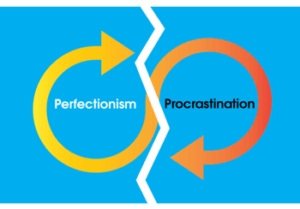Coaching Around Toxic Perfectionism
In my coaching, I run into people who suffer from what I call “toxic perfectionism.” Over the years and in the various scholarly journals, much has been written about perfectionism, some positive and some negative. Adam Furnham, Ph.D. wrote in his article “The Curse of Perfectionism,” “Is perfectionism a highly desirable trait that ensures high standards and utter reliability, or a psychological handicap indicative of dithering, delay, and delusions?”

In this article, I am not trying to discuss your run of the mill wanting things to work out well, or even—as most of us would like—perfectly. I am talking about with struggle with toxic perfectionism. Your average perfectionist is organized, has personally selected high standards, and when they are in positions of authority, are likely to try and make those around them abide by their standards. This isn’t want I am talking about. I am talking about those of us who “believe” that it is their singular role in life to be perfect. You may find them having heated conversations with a very harsh “inner critic” that drives them from waking to sleep. It is like conversations with your “gremlin,” and this conversation leaves them with a wretched way of being in the world. Many of them even have accepted that their being worthy of things like being loved is related to their not making mistakes. In a style of life similar to hoarding, they don’t know the meaning of enough, and it becomes black or white…survival or death…see the problem?
Clients who describe themselves as this kind of toxic perfectionist are often described by psychologists as having a kind of a handicap. They see this type of perfectionism as a sort of disability that plagues their client with a constant worry of failing. Contrary to what you might expect, in examples of toxic perfectionism, the person will resort to procrastination, uncertainty, and eventually even disgrace rather than making a mistake. Many toxic perfectionists blame persons in their life who hold positions of power for their abnormally high standards. They willingly punish themselves for what they see as a setback or a mistake.
While they typically have developed black and white thinking over time, their neural pathways now guide them back to the same place. Repeatedly, they either see events as a total “success” or a complete “failure.” To them, there is no in between. It is exhausting for them and their families.

Toxic perfectionists, as compared to the other, more benign form, are most often living lives that they themselves might describe as miserable and unproductive. Look, there is nothing wrong with having high standards, very high indeed. But your standards need to be achievable with the energy you have. Results that leave you happy with yourself and not cursed. When the toxic perfectionist sets his or her standards to an unachievable level, they sentence themselves to never achieving their goals. According to Dr. Furnham, here is the kind of self-talk toxic perfectionists indulge in regularly:
Excessively apprehensive about mistakes
“People will probably think less of me if I make a mistake. “I should be upset if I make a mistake.”
Un-naturally high personal yardsticks
“If I do not set the highest standards for myself, I am likely to end up a second-rate person; I hate being less than the best at things.”
Thinking that their parents had too high personal benchmarks
“My parents expected excellence from me; my parents wanted me to be the best at everything.”
Parents are perceived as being overly judging
“As a child I was punished for doing things less than perfect; I never felt like I could meet my parent’s standards.”
Extreme focus on “order and organization”
“Organization is very important to me; I try to be a neat person.”
According to Dr. Furnham, here is how it goes:
Set unreachable goals → fail to reach them → become depressed and lethargic → have less energy and a deep sense of failure → get lower self-esteem and high self-blame.
Learning the differences between toxic and healthy perfectionism
The differences between the two are pretty clear when you see them side by side in the various parts of life. Take a look at the following and see what I mean.

Relationships
Healthy: You feel really good about your goals. You feel motivated and have a feeling of enjoyment as you pursue them.
Toxic: You feel fear and a sense of foreboding that you might not do as well as you hope. It can feel like a weight on your soul.
Inclination to act impetuously
Healthy: You make plans to take action, and you improve your performance as you move along your planned path.
Toxic: You procrastinate as a rule since you are looking for that “best” moment to act.

Satisfaction
Healthy: You cheer your little successes and give credit to yourself when you deserve it.
Toxic: You are always unhappy with your performance, your creations, or your thoughts. You never feel like you have done enough.

Large vs. Small
Healthy: You can see the overall scheme and do what you need to do to get the outcome you want.
Toxic: You fixate on repairing every little mistake without regard for how important the mistake might be, or how much energy it takes for your level of perfection.
You vs. Work
Healthy: You have a genuine interest in relationships, getting enough rest, and are attentive to your own health.
Toxic: Neglecting of your relationships, the rest you need to do a good job at work and the lifestyle you need to maintain a healthy life.
Today’s Failures
Healthy: When you do fail, you concentrate on what you can learn from them. You recognize that success and failure are two sides of the same coin; you can’t have one without the other.
Toxic: Failure is something that you despise. You whip yourself into a frenzy or depression for even the tiniest of mistakes made by you or those around you.
Yesterday’s Mistakes
Healthy: As with the failures, you use mistakes as a learning opportunity. You don’t judge, you just try and learn moving forward.
Toxic: For the most part, you feel sorry for everything that you have ever done wrong, every mistake you have ever made.

Closing the Circle
All people are imperfect in one way or another, and most of us a lot more than just one. It is part of being human. We all make mistakes and we all fall short of our goals at times. When you waste too much energy laboring to live a life free from mistakes, you start to feel like a victim in your own life, at the expense of everything, when in fact, it is only you.
As a coach, I submit to you that there is another way. By embracing your imperfections and allowing yourself to be vulnerable, you will discover at long last your true self and unearth a life that really is worth living. Give it a try!
In a part two of this blog I will deal with things you can do to combat toxic perfectionism. The ways I deal with toxic perfectionism aren’t particularly new. Anyone who has ever read a self-help book will have read of these ideas. Together though, they combine to be very helpful for the toxic perfectionist.

Source: Dr. Adrian Furnham, Ph.D., “The Curse of Perfectionism


